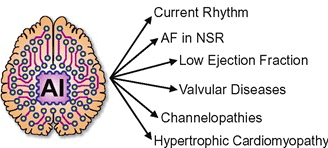By ZI Attia et al
Taken directly from the European Heart Journal
Artificial intelligence (AI) has given the electrocardiogram (ECG) and clinicians reading them super-human diagnostic abilities. Trained without hard-coded rules by finding often subclinical patterns in huge datasets, AI transforms the ECG, a ubiquitous, non-invasive cardiac test that is integrated into practice workflows, into a screening tool and predictor of cardiac and non-cardiac diseases, often in asymptomatic individuals.

This review describes the mathematical background behind supervised AI algorithms, and discusses selected AI ECG cardiac screening algorithms including those for the detection of left ventricular dysfunction, episodic atrial fibrillation from a tracing recorded during normal sinus rhythm, and other structural and valvular diseases. The ability to learn from big data sets, without the need to understand the biological mechanism, has created opportunities for detecting non-cardiac diseases as COVID-19 and introduced challenges with regards to data privacy. Like all medical tests, the AI ECG must be carefully vetted and validated in real-world clinical environments.
Finally, with mobile form factors that allow acquisition of medical-grade ECGs from smartphones and wearables, the use of AI may enable massive scalability to democratise healthcare.
Read full article here: https://academic.oup.com/eurheartj/advance-article-abstract/doi/10.1093/eurheartj/ehab649/6371908
References:
Zachi I Attia, David M Harmon, Elijah R Behr, Paul A Friedman, Application of artificial intelligence to the electrocardiogram, European Heart Journal, 2021;, ehab649, https://doi.org/10.1093/eurheartj/ehab649

